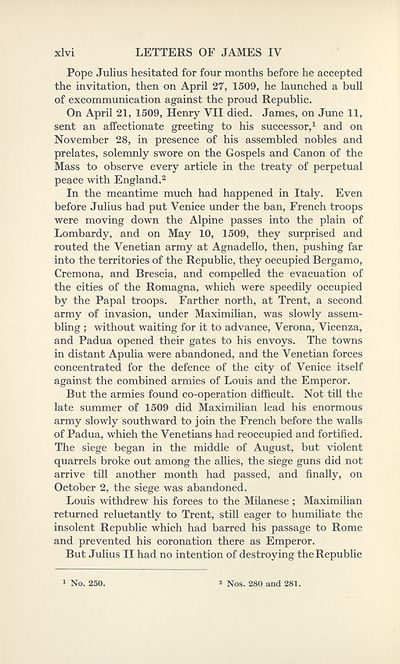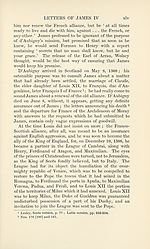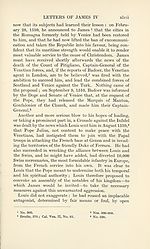Series 3 > Letters of James the Fourth, 1505-1513
(53) Page xlvi
Download files
Complete book:
Individual page:
Thumbnail gallery: Grid view | List view

xlvi
LETTERS OF JAMES IV
Pope Julius hesitated for four months before he accepted
the invitation, then on April 27, 1509, he launched a bull
of excommunication against the proud Republic.
On April 21, 1509, Henry VII died. James, on June 11,
sent an affectionate greeting to his successor,1 and on
November 28, in presence of his assembled nobles and
prelates, solemnly swore on the Gospels and Canon of the
Mass to observe every article in the treaty of perpetual
peace with England.2
In the meantime much had happened in Italy. Even
before Julius had put Venice under the ban, French troops
were moving down the Alpine passes into the plain of
Lombardy, and on May 10, 1509, they surprised and
routed the Venetian army at Agnadello, then, pushing far
into the territories of the Republic, they occupied Bergamo,
Cremona, and Brescia, and compelled the evacuation of
the cities of the Romagna, which were speedily occupied
by the Papal troops. Farther north, at Trent, a second
army of invasion, under Maximilian, was slowly assem¬
bling ; without waiting for it to advance, Verona, Vicenza,
and Padua opened their gates to his envoys. The towns
in distant Apulia were abandoned, and the Venetian forces
concentrated for the defence of the city of Venice itself
against the combined armies of Louis and the Emperor.
But the armies found co-operation difficult. Not till the
late summer of 1509 did Maximilian lead his enormous
army slowly southward to join the French before the walls
of Padua, which the Venetians had reoccupied and fortified.
The siege began in the middle of August, but violent
quarrels broke out among the allies, the siege guns did not
arrive till another month had passed, and finally, on
October 2, the siege was abandoned.
Louis withdrew his forces to the Milanese ; Maximilian
returned reluctantly to Trent, still eager to humiliate the
insolent Republic which had barred his passage to Rome
and prevented his coronation there as Emperor.
But Julius II had no intention of destroying the Republic
1 No. 250.
2 Nos. 280 and 281.
LETTERS OF JAMES IV
Pope Julius hesitated for four months before he accepted
the invitation, then on April 27, 1509, he launched a bull
of excommunication against the proud Republic.
On April 21, 1509, Henry VII died. James, on June 11,
sent an affectionate greeting to his successor,1 and on
November 28, in presence of his assembled nobles and
prelates, solemnly swore on the Gospels and Canon of the
Mass to observe every article in the treaty of perpetual
peace with England.2
In the meantime much had happened in Italy. Even
before Julius had put Venice under the ban, French troops
were moving down the Alpine passes into the plain of
Lombardy, and on May 10, 1509, they surprised and
routed the Venetian army at Agnadello, then, pushing far
into the territories of the Republic, they occupied Bergamo,
Cremona, and Brescia, and compelled the evacuation of
the cities of the Romagna, which were speedily occupied
by the Papal troops. Farther north, at Trent, a second
army of invasion, under Maximilian, was slowly assem¬
bling ; without waiting for it to advance, Verona, Vicenza,
and Padua opened their gates to his envoys. The towns
in distant Apulia were abandoned, and the Venetian forces
concentrated for the defence of the city of Venice itself
against the combined armies of Louis and the Emperor.
But the armies found co-operation difficult. Not till the
late summer of 1509 did Maximilian lead his enormous
army slowly southward to join the French before the walls
of Padua, which the Venetians had reoccupied and fortified.
The siege began in the middle of August, but violent
quarrels broke out among the allies, the siege guns did not
arrive till another month had passed, and finally, on
October 2, the siege was abandoned.
Louis withdrew his forces to the Milanese ; Maximilian
returned reluctantly to Trent, still eager to humiliate the
insolent Republic which had barred his passage to Rome
and prevented his coronation there as Emperor.
But Julius II had no intention of destroying the Republic
1 No. 250.
2 Nos. 280 and 281.
Set display mode to:
![]() Universal Viewer |
Universal Viewer | ![]() Mirador |
Large image | Transcription
Mirador |
Large image | Transcription
Images and transcriptions on this page, including medium image downloads, may be used under the Creative Commons Attribution 4.0 International Licence unless otherwise stated. ![]()
| Scottish History Society volumes > Series 3 > Letters of James the Fourth, 1505-1513 > (53) Page xlvi |
|---|
| Permanent URL | https://digital.nls.uk/126697227 |
|---|
| Attribution and copyright: |
|
|---|
| Description | Over 180 volumes, published by the Scottish History Society, containing original sources on Scotland's history and people. With a wide range of subjects, the books collectively cover all periods from the 12th to 20th centuries, and reflect changing trends in Scottish history. Sources are accompanied by scholarly interpretation, references and bibliographies. Volumes are usually published annually, and more digitised volumes will be added as they become available. |
|---|


